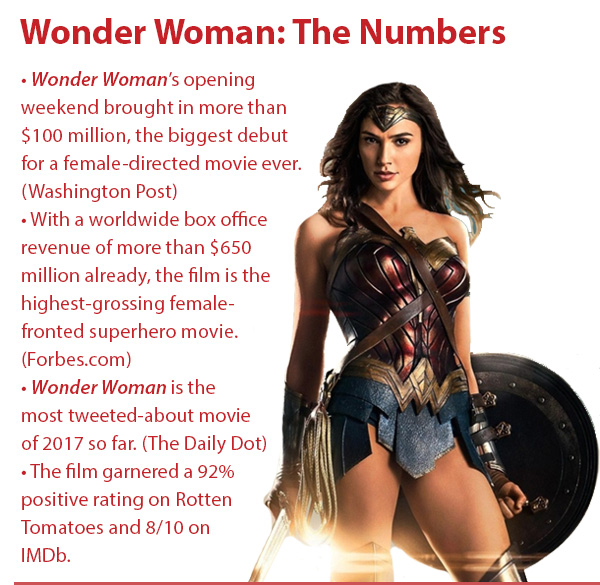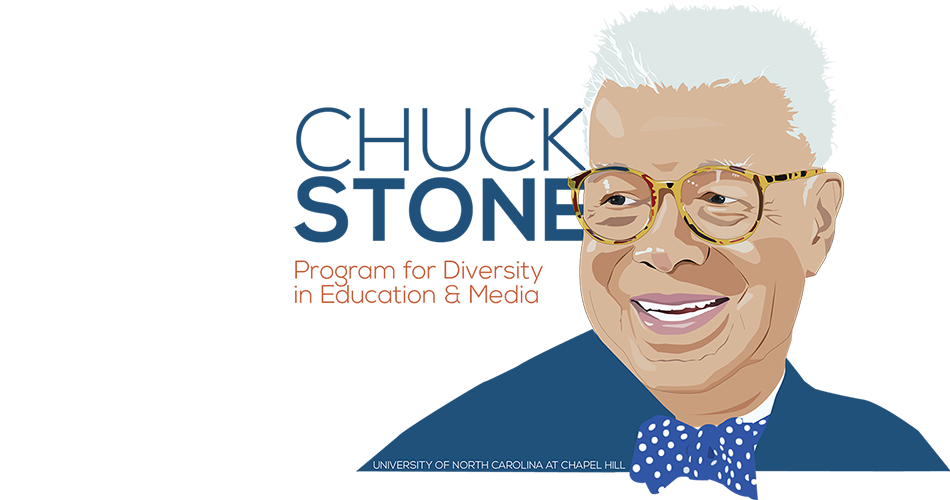Wonder Woman: A Success for Females Onscreen?
By Zoe Boggs
Female-led, female-directed Wonder Woman shattered multiple glass ceilings, but the highly praised film wasn’t immune to accusations of sexualization and whitewashing.
“I’m really glad that there is a strong female character that isn’t just a sidekick,” said Dr. Francesca Carpentier, a professor at the UNC School of Media and Journalism. “But there’s definitely an element of male fantasy being played upon.”
Since Wonder Woman appeared in comic books in the 1940s, her outfit has been traditionally tight and suggestive. Although 2017’s costume was modified from the busty bodysuit of the 1970s TV show to slightly less revealing armor, some critics note that the costume is still impractically tight and skimpy. Additionally, leading actress Gal Gadot is a former beauty pageant winner and a paradigm of typical female beauty.
 Carpentier is concerned about the comparison and self-objectification that such conventionally sexy female leads can cause in young girls. “If a person being objectified is quite nice-looking, like Gal Gadot, that can become a point of comparison where you’re more likely to compare other women against that ideal and have more negative feelings about women,” she said.
Carpentier is concerned about the comparison and self-objectification that such conventionally sexy female leads can cause in young girls. “If a person being objectified is quite nice-looking, like Gal Gadot, that can become a point of comparison where you’re more likely to compare other women against that ideal and have more negative feelings about women,” she said.
However, Carpentier lauds Wonder Woman for subverting the male gaze that is typical of superhero movies. “At first, [sidekick] Steve Trevor is almost the one who is objectified,… and it quickly becomes about him seeing her as a surprising equal,” she said.
The film has also sparked critiques of the continuous racial homogeny in Hollywood. Practically the entire cast is white, and Gadot, while Israeli, is not generally seen as a person of color.
Recent movements such as “#oscarssowhite” have drawn attention to the film industry’s lack of diversity, but progress is slow. A 2016 USC study found that just 28.3 percent of speaking characters in movies and TV shows are non-white.
“Our storytelling has remained very much in the narrative of whiteness,” said Dr. Kumarini Silva, an assistant professor at the UNC Department of Communications.
“A lot of times, mediated experiences stand in for real experiences, and therefore representation can seem really real,” said Silva. “It can form a person’s opinion about particular groups of people and identities.”
Some argue that without positive and well-rounded examples of diverse women onscreen, many young girls will grow up without seeing anyone like them to emulate, and many widely held stereotypes will never be challenged.
For many, Wonder Woman is a step in the right direction. The film proved that female-fronted comic book movies can be hugely successful and critically acclaimed, giving women the powerful and multi-faceted hero that they have been waiting for. However, some say that representation of women and of minorities doesn’t have to be mutually exclusive. More visibility of diverse faces is necessary for increasing society’s tolerance.
“I think that media have a significant role in changing people’s perceptions and influencing a societal shift,” said Silva. “Part of it is also thinking beyond the stereotypes. It’s not just so much showing diverse characters, but showing a diversity of personality as well.”
